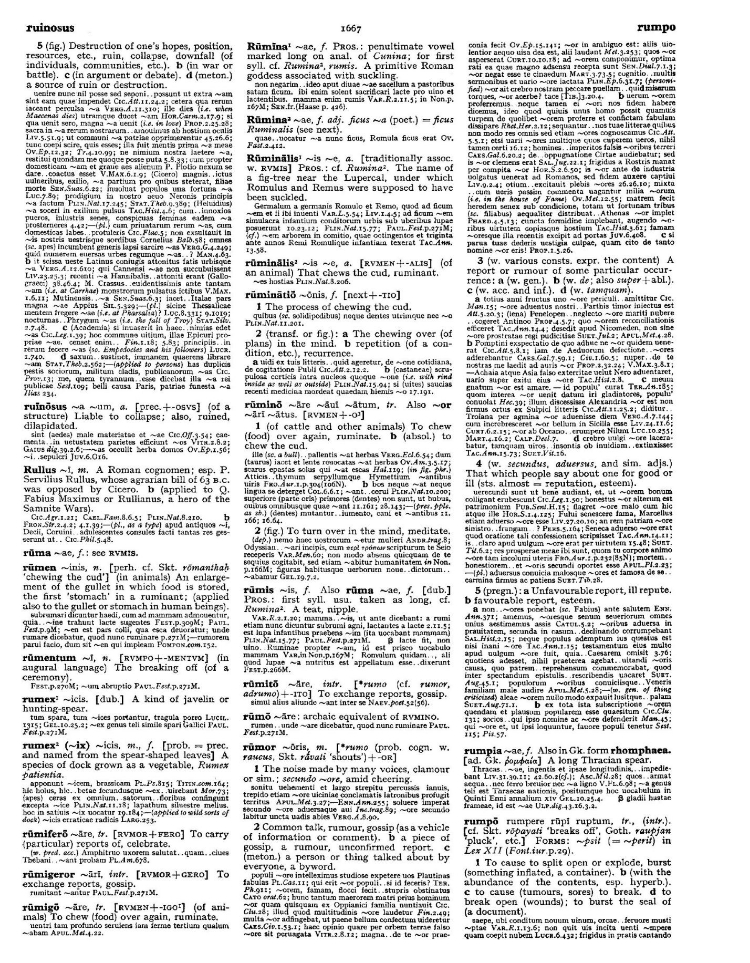
page_listing.tpl
page_subListingDetails.tpl
sub_listingDetails_style1.tpl
sub_listingDetails.title.tpl
rūmor rumor
rūmor is a Latin Noun that primarily means rumor.
Definitions for rūmor
Wheelock's Latin
Noun
- 1
rumor, gossip
English derivatives:
rumormonger
Oxford Latin Dictionary
Noun
- 1
The noise made by many voices, clamour or sim.; secundo ~ore, amid cheering.
- 2
Common talk, rumour, gossip (as a vehicle of information or comment). (b) a piece of gossip, a rumour, unconfirmed report. (c) (meton.) a person or thing talked about by everyone, a byword.
- 3
(w. various consts. expr. the content) A report or rumour of some particular occurence: (a) (w. gen.). (b) (w. de; also super+abl.). (c) (w. acc. and inf.). (d) (w. tamquam).
Sentences with rūmor
Latin to English
Celer rūmor (celeris fāma) per omnem terram cucurrit.Compare Swift rumor ran through every land.
Rumoresque senum severiorum omnes unius aestimemus assis.Compare Let us value all the gossips of the stern old men as worth but a penny.
Noenum rumores ponebat ante salutem; ergo postque magisque viri nunc gloria claret.Compare He never put rumors before our safety; and so today his glory shines the brighter.
De ille Alexandria discessus, nihil adhuc rumor.Compare Concerning his departure from Alexandriam there is as yet no rumour.
Neque omnis tam firmus et constans animus contra adversus rumor sum possum, quam Fabius sum.Compare Nor can all be of so firm and steady a spirit against evil report as Fabius was.
Alius ab alius impletus rumor domus redeo.Compare They return to their homes, filled one by the other with reports.
Declension table for rūmor
Cactus2000
| Singular | Plural | |
| Nom. | rūmor | rūmōrēs |
| Gen. | rūmōris | rūmōrum |
| Dat. | rūmōrī | rūmōribus |
| Acc. | rūmōrem | rūmōrēs |
| Abl. | rūmōre | rūmōribus |
Data sources
Notes
- Definitions
- Frederick M. Wheelock, Wheelock's Latin, 6th ed., rev. Richard A. LaFleur (New York, NY: HarperCollins Publishers, 2005): 214.
- P. G. W. Glare, Oxford Latin Dictionary, Vols. 1-8 (Oxford: Clarendon Press, 1982): 1667.
- Word frequencies
- Paul B. Diederich, The Frequency of Latin Words and Their Endings, PhD diss., (Columbia University, 1939).
Bibliography
Allen, Joseph H. Allen and Greenough's New Latin Grammar for Schools and Colleges: Founded on Comparative Grammar. Edited by James B. Greenough, George L. Kittredge, Albert A. Howard, and Benjamin L. D'Ooge. Boston, MA: Ginn & Company, 1903.
Crystal, David. A Dictionary of Linguistics and Phonetics. 6th ed. Oxford, UK: Blackwell Publishing, 2008.
Delatte, Louis, Suzanne Govaerts, Joseph Denooz, and Etienne Evrard. Dictionnaire fréquentiel et index inverse de la langue latine [Frequency Dictionary and Inverse Index of the Latin Language]. Liège, Belgium: Laboratoire d'analyse statistique des langues anciennes de l'Université de Liège (L.A.S.L.A.), 1981.
Diederich, Paul B. The Frequency of Latin Words and Their Endings. PhD diss., Columbia University, 1939.
Francese, Christopher. "Latin Core Vocabulary." Dickinson College Commentaries. Last modified 2014. http://dcc.dickinson.edu/latin-vocabulary-list.
Gildersleeve, Basil L., and Gonzales Lodge. Gildersleeve's Latin Grammar: Third Edition, Revised, and Enlarged. 3rd ed. London, England: Macmillan and Co., 1903.
Glare, Peter G.W. Oxford Latin Dictionary. Vols. 1-8. Oxford, England: Clarendon Press, 1982.
Krüger, Bernd. "Latin Conjugation Tables." Cactus2000. Accessed May 5, 2023. https://latin.cactus2000.de/index.en.php.
Pierson, Nick. "Sound of Text." Accessed October 26, 2019. https://soundoftext.com.
Wheelock, Frederick M. Wheelock's Latin. 6th ed. Revised by Richard A. LaFleur. New York, NY: HarperCollins Publishers, 2005.
Wiktionary Contributors. "Victionarium." Wikimedia Foundation, Inc. Updated March 18, 2019. https://la.wiktionary.org/wiki/Victionarium:Pagina_prima.
Citation
Chicago (17th ed.)
Allo Contributors. "rūmor, rūmōris (n.) - Latin Word Definition." Allo Latin Dictionary. Last modified . Accessed February 20, 2026. http://ancientlanguages.org/latin/dictionary/rumor-rumoris.
Entry created on . Last updated on .







